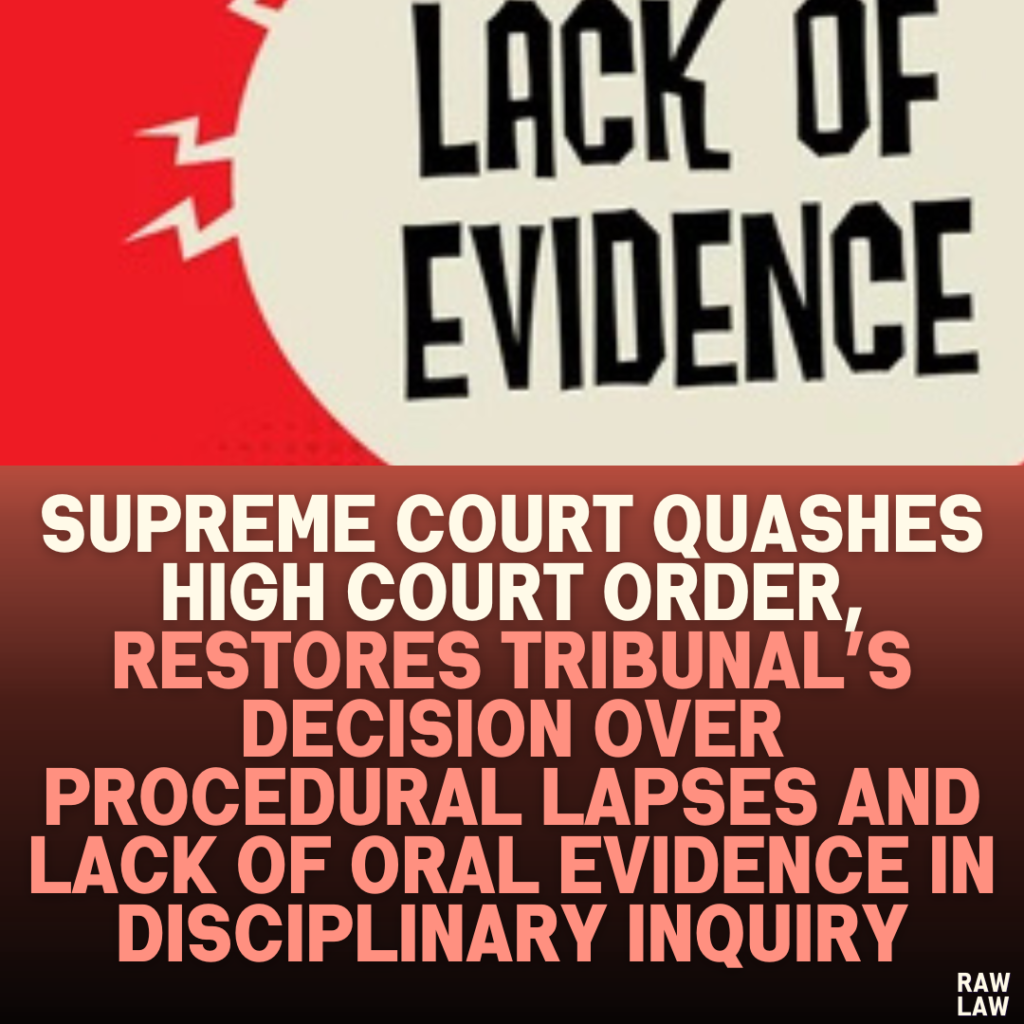Court’s Decision
The Supreme Court allowed the appeal, quashed the judgment of the Allahabad High Court, and restored the decision of the State Public Services Tribunal. It held that the disciplinary proceedings and the resultant penalty were invalid as no oral evidence was recorded in accordance with the applicable rules. The appellant was granted all consequential benefits, with a directive for monetary benefits to be disbursed within two months, failing which interest at 6% per annum would apply.
Facts
The appellant, an Assistant Commissioner of Commercial Tax, faced disciplinary proceedings initiated by a charge sheet dated March 5, 2012. The Inquiry Officer submitted a report on November 29, 2012, finding the charges against the appellant proven. The Disciplinary Authority imposed a penalty of a censure entry and stoppage of two grade increments with cumulative effect on November 5, 2014.
Aggrieved, the appellant filed a claim before the State Public Services Tribunal, which quashed the penalty and directed consequential benefits. The Tribunal found that the Inquiry Officer had relied on documents without oral evidence and had not properly evaluated the appellant’s explanation.
The High Court, upon a writ petition filed by the State, reversed the Tribunal’s decision and reinstated the penalty, leading to the current appeal.
Issues
- Whether the inquiry proceedings adhered to the procedural requirements under Rule 7 of the Uttar Pradesh Government Servant (Discipline and Appeal) Rules, 1999.
- Whether the lack of oral evidence invalidated the disciplinary proceedings and the penalty imposed.
Petitioner’s Arguments
- The disciplinary proceedings were conducted in violation of Rule 7(3) of the 1999 Rules, which mandates the recording of oral evidence when major penalties are proposed.
- The Inquiry Officer failed to examine any witnesses to substantiate the charges.
- The findings of the Inquiry Officer were baseless and non-est in the eyes of the law.
Respondent’s Arguments
- The findings of the Inquiry Officer and the penalty imposed by the Disciplinary Authority were based on a proper evaluation of the record.
- The High Court rightly interfered with the Tribunal’s order as it exercised its writ jurisdiction in accordance with Article 226 of the Constitution.
Analysis of the Law
The Supreme Court examined Rule 7 of the 1999 Rules, which mandates the recording of oral evidence in disciplinary proceedings involving major penalties. The court observed:
- The Inquiry Officer must examine witnesses and allow the delinquent officer to cross-examine them.
- The absence of oral evidence renders the proceedings invalid.
Precedent Analysis
The court relied on several judgments, including:
- Roop Singh Negi v. Punjab National Bank (2009): Held that documentary evidence must be corroborated by oral testimony, as disciplinary proceedings are quasi-judicial.
- State of Uttar Pradesh v. Saroj Kumar Sinha (2010): Emphasized the need for Inquiry Officers to independently evaluate evidence, even in ex-parte inquiries.
- Nirmala J. Jhala v. State of Gujarat (2013): Stated that evidence from preliminary inquiries cannot replace oral evidence in regular inquiries.
Court’s Reasoning
The court held that the inquiry against the appellant was fundamentally flawed:
- No oral evidence was recorded to substantiate the charges.
- The findings of the Inquiry Officer were irrational and unsupported by evidence.
- The High Court erred in reinstating the penalty, ignoring the procedural lapses highlighted by the Tribunal.
Conclusion
The Supreme Court quashed the High Court’s order and restored the Tribunal’s judgment, emphasizing the importance of adhering to procedural rules in disciplinary proceedings.
Implications
This judgment reinforces the principle that disciplinary proceedings must comply with procedural safeguards, including the recording of oral evidence. It underscores the importance of fairness and adherence to natural justice, particularly in cases involving major penalties.




Pingback: Supreme Court Restores ₹1.75 Lakh Maintenance for Wife: Highlights Comfortable Lifestyle with Domestic Help During Marriage, Faults Madras HC for Reducing Amount Despite Husband’s Income as a Cardiologist - Raw Law